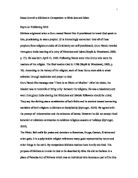Both religions state that ‘God’ created the universe by the power of his word/command. (e.g. ‘Let there be light’), and with reference to The Cosmological argument, God within Christianity is timeless and spaceless, because this is part of his creation, the same as Brahman. However, whilst both God’s are eternal, it may not be clear that Brahman is outside time and space (primeval).
Whilst both religions seem to be in this context, they are however similar in how they perceive their ‘God’. Firstly both express their God as the ultimate explanation for the universe, Within Christianity, there is only one God and he is described as ‘holy’ – meaning special, separate and different. He is Omniscient (Infinite knowledge), omnipotence (ultimate power), omnipresence (present everywhere) and Omnibenevolent (All loving) and Thomas Aquinas (CMA) states he is the first mover and causer of the universe. He is a necessary being (not dependent) – This can again be demonstrated from Genesis; ‘God must be timeless and spaceless to have been pre-existent before the beginning’
Similarly, Hindus believe that there is one true God, the supreme spirit, called Brahman. They suggest that Brahman is present in every person as the eternal spirit of their soul (showing a similar belief to an Omnipresent God). To Hindus, Brahman contains everything: To Christians, God IS everything.
Hindu scriptures tell us that realizing our true essence (atman) as Brahman, will mean an end to all suffering, which can be contemplated to say that Brahman also has an omnibenevolent nature.
However, raising one of the main conflicting comparisons between the two religions; Christians are monotheistic, they believe in only one personal God; this allows for a deity-devotee relationship. (A loving relationship between God/Goddess and worshiper) Romans 5:8: ‘but God shows his love for us in that while we were still sinners, Christ died for us’
Within Hinduism, everything is one. (Monism) Whilst it’s similar, in a way that God in Christianity has 3 descriptions ‘The God, the father, and the holy spirit’, and God (Brahman) in Hinduism is made out up of 3 forms; there are still conflicts that arise as there cannot be a deity-devotee relationship within Hinduism beliefs. (I.e. you cannot have a relationship if everything is one). In some aspects, Hinduism Is believed to be a polytheistic religion for the Gods and Goddesses are all real, separate and personal individuals to love and worship. On this belief, there is a strong deity-devotee relationship which is able.
Like any relationship, arguably both sides should be getting something out of it – love, trust, gratitude, protection etc. Also, confusion and doubt at times. Although, in the case of a relationship with God/Goddess, it includes faith – which is necessary for God is so unique and incomparable. We can compare faith in Christianity and Hinduism; for example, Job, an extremely righteous man innocently suffering the loss of his possessions and family, still devotes himself to God: ‘Though he slay me, yet will I trust in him: but I will maintain mine own ways before him’ - his faith is not broken and he is later rewarded for his devotion with a new family and a new life; this is similar to Jnana Yoga in Hinduism beliefs. The faith performed in the practice is the key because ultimately the intellect is abandoned; utter dedication to a true understanding of one self will result in liberation (Moksha). Thus showing that both religions similarly have a challenging faith to undertake, even with relation to evil and suffering in the world; although Christianity is more based on trust and understanding; they follow rules (the 10 commandments) to show God their dedication and faith; whereas in Hinduism, you are trying to gain the trust and understanding for yourselves. (E.g. in yoga, the realisation after all desires of Samsara are ridden, that you are one, everything is one)
A loving relationship with God is promised in both religions: if they understand and abide by God’s rules and gift of life (Christianity) or if they dedicate and commit their love profusely/ realize their true essence as Brahman. (Bhakti & Jnana Yoga) From this I believe it is a more realistic relationship within Christianity as they are to follow his teachings, the same as with a parent and a child. Whilst Hinduism involves more complex and intellectual areas of development in order to achieve a relationship with Brahman. Although, it is possible for anyone to reach this through Bhakti Yoga which involves pure loving devotion, which arguably anyone is capable of.
From this, suffering is understandably a major problem for both religions. For Christians, there are many arguments for the resolution of suffering; however the main one being reinforced by Augustine stating that since God endowed people with free will, we are able to choose freely to do evil or to do well. It is a test. “When the will abandons what is above itself, and turns to what is lower, it becomes evil - not because that is evil to which it turns, but because the turning itself is wicked” (Hick, quoting Augustine) In Christianity hell is deemed as the eternal fate for sinners, in Hinduism it is a constant cycle of rebirths – an entrapment in Samsara. (Bhagavad Gita) “As a man casts off his worn-out clothes and takes on other new ones, so does the embodied soul cast off his worn-out bodies and enters other new”.
Nonetheless, both Christian and Hindu beliefs take into account free will and own choices as a cause of suffering. Within Hinduism, Karma is the sum of a person’s actions in this and his previous state of existence; it follows as an effect of a cause. Both religions are also content to embrace the existence of suffering in the world, and in doing so, obtain Moksha (Hinduism), a release from the cycle of Samsara; and a new life brought up by God for Christians. Both therefore offer salvation through faith, love, and understanding, although it is also obvious to state that within Christianity salvation is found through God and Jesus Christ, whereas in Hinduism it is found from one’s own efforts (E.g. in Yoga). Although, in Bhakti Yoga there is emphasis upon the deities; e.g. loving Krishna will lead to salvation.
Incarnation is apparent in both religions; Jesus Christ and Krishna. Christians believe the incarnation of Jesus Christ was for the assurance of eternal life; by being born as a human being, and then dying on the cross, Jesus made ‘life after death’ possible. Jesus said, ‘I am the resurrection and the life. He who believes in me will live, even though he dies.’ They believe if they follow Jesus’s teachings, and accept him as their Lord and saviour, then this new resurrection life awaits them. Krishna’s mission however being somewhat simpler was to rid the world of villains and produce a glimpse into the private life of God (increasing the chance of a deity-devotee relationship). Another difference being that Krishna is believed to of been incarnated many times for various different tasks.
As we have already established, within Hindu beliefs, we are all trapped in the cycle of Samsara (i.e. reincarnation). Hindus believe that a person’s atman (spirit) is permanent and cannot change while the physical body is not permanent and can change. The atman is reborn many times and death is seen as a natural event so that the atman can move nearer to the ultimate release from rebirth; once the atman has reached moksha it can rest.
Similar to this, Christians also believe in a life after death, however there are many different aspects to this life. Some, (E.g. Roman Catholics) believe in purgatory which is a time of cleansing from sin and preparing for heaven. Some also believe in hell, which is a place of evil and suffering for those who have sinned; Many Christians believe that there is a place in the Kingdom of God for members of other faiths, and for many who have not even believed in God on earth but have ‘done the will of God’ in many ways without knowing it. It has been told the in Christianity, heaven and hell is far too simplistic. John Hicks theodicy: ‘It’s not reincarnation but it’s similar, it has an emphasis on further opportunities after death to grow and develop.’ This means that whilst both religions show an aspect to reincarnations within their beliefs; the true goal is to produce a loving relationship that is brought up with God in salvation after death. Whilst it is an obvious notion to assume that nothing occurs after death, some, myself included could argue that this is just giving up on the matter.
Both Hinduism and Christianity reject materialism as a substantial way of reaching salvation, as they are only temporary desires with minimal fulfilment. Jesus said: ‘Easier for a camel to go through the eye of a needle, than for a rich man to enter the kingdom of heaven’. Hindus show their ignorance to material possessions through yoga and deep dedication to God.
In conclusion I believe that whilst both relgions show various similarities and differences in relation to god and/or existence; for example they both believe in a divine being who is all loving and all powerful and a existence after death. In relation to creation myths however Christians that it was ex-nihilo, whereas Hinduism declares an emergance out of Brahman. From this it is clear that whatever God is he is perhaps so unique that neither Christianity, Hinduism nor anyone else for that matter can ever give any rational explanation of him.








